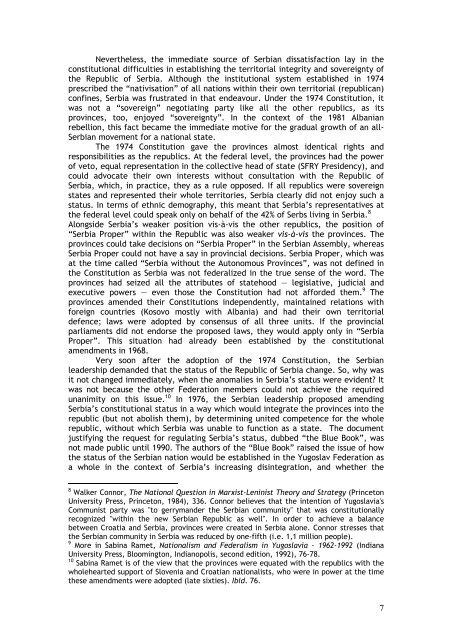Ethnic Mobilization in Serbia - EURAC
Ethnic Mobilization in Serbia - EURAC
Ethnic Mobilization in Serbia - EURAC
Create successful ePaper yourself
Turn your PDF publications into a flip-book with our unique Google optimized e-Paper software.
Nevertheless, the immediate source of <strong>Serbia</strong>n dissatisfaction lay <strong>in</strong> the<br />
constitutional difficulties <strong>in</strong> establish<strong>in</strong>g the territorial <strong>in</strong>tegrity and sovereignty of<br />
the Republic of <strong>Serbia</strong>. Although the <strong>in</strong>stitutional system established <strong>in</strong> 1974<br />
prescribed the “nativisation” of all nations with<strong>in</strong> their own territorial (republican)<br />
conf<strong>in</strong>es, <strong>Serbia</strong> was frustrated <strong>in</strong> that endeavour. Under the 1974 Constitution, it<br />
was not a “sovereign” negotiat<strong>in</strong>g party like all the other republics, as its<br />
prov<strong>in</strong>ces, too, enjoyed “sovereignty”. In the context of the 1981 Albanian<br />
rebellion, this fact became the immediate motive for the gradual growth of an all-<br />
<strong>Serbia</strong>n movement for a national state.<br />
The 1974 Constitution gave the prov<strong>in</strong>ces almost identical rights and<br />
responsibilities as the republics. At the federal level, the prov<strong>in</strong>ces had the power<br />
of veto, equal representation <strong>in</strong> the collective head of state (SFRY Presidency), and<br />
could advocate their own <strong>in</strong>terests without consultation with the Republic of<br />
<strong>Serbia</strong>, which, <strong>in</strong> practice, they as a rule opposed. If all republics were sovereign<br />
states and represented their whole territories, <strong>Serbia</strong> clearly did not enjoy such a<br />
status. In terms of ethnic demography, this meant that <strong>Serbia</strong>’s representatives at<br />
the federal level could speak only on behalf of the 42% of Serbs liv<strong>in</strong>g <strong>in</strong> <strong>Serbia</strong>. 8<br />
Alongside <strong>Serbia</strong>’s weaker position vis-à-vis the other republics, the position of<br />
“<strong>Serbia</strong> Proper” with<strong>in</strong> the Republic was also weaker vis-à-vis the prov<strong>in</strong>ces. The<br />
prov<strong>in</strong>ces could take decisions on “<strong>Serbia</strong> Proper” <strong>in</strong> the <strong>Serbia</strong>n Assembly, whereas<br />
<strong>Serbia</strong> Proper could not have a say <strong>in</strong> prov<strong>in</strong>cial decisions. <strong>Serbia</strong> Proper, which was<br />
at the time called “<strong>Serbia</strong> without the Autonomous Prov<strong>in</strong>ces”, was not def<strong>in</strong>ed <strong>in</strong><br />
the Constitution as <strong>Serbia</strong> was not federalized <strong>in</strong> the true sense of the word. The<br />
prov<strong>in</strong>ces had seized all the attributes of statehood — legislative, judicial and<br />
executive powers — even those the Constitution had not afforded them. 9 The<br />
prov<strong>in</strong>ces amended their Constitutions <strong>in</strong>dependently, ma<strong>in</strong>ta<strong>in</strong>ed relations with<br />
foreign countries (Kosovo mostly with Albania) and had their own territorial<br />
defence; laws were adopted by consensus of all three units. If the prov<strong>in</strong>cial<br />
parliaments did not endorse the proposed laws, they would apply only <strong>in</strong> “<strong>Serbia</strong><br />
Proper”. This situation had already been established by the constitutional<br />
amendments <strong>in</strong> 1968.<br />
Very soon after the adoption of the 1974 Constitution, the <strong>Serbia</strong>n<br />
leadership demanded that the status of the Republic of <strong>Serbia</strong> change. So, why was<br />
it not changed immediately, when the anomalies <strong>in</strong> <strong>Serbia</strong>’s status were evident? It<br />
was not because the other Federation members could not achieve the required<br />
unanimity on this issue. 10 In 1976, the <strong>Serbia</strong>n leadership proposed amend<strong>in</strong>g<br />
<strong>Serbia</strong>’s constitutional status <strong>in</strong> a way which would <strong>in</strong>tegrate the prov<strong>in</strong>ces <strong>in</strong>to the<br />
republic (but not abolish them), by determ<strong>in</strong><strong>in</strong>g united competence for the whole<br />
republic, without which <strong>Serbia</strong> was unable to function as a state. The document<br />
justify<strong>in</strong>g the request for regulat<strong>in</strong>g <strong>Serbia</strong>’s status, dubbed “the Blue Book”, was<br />
not made public until 1990. The authors of the “Blue Book” raised the issue of how<br />
the status of the <strong>Serbia</strong>n nation would be established <strong>in</strong> the Yugoslav Federation as<br />
a whole <strong>in</strong> the context of <strong>Serbia</strong>’s <strong>in</strong>creas<strong>in</strong>g dis<strong>in</strong>tegration, and whether the<br />
8 Walker Connor, The National Question <strong>in</strong> Marxist-Len<strong>in</strong>ist Theory and Strategy (Pr<strong>in</strong>ceton<br />
University Press, Pr<strong>in</strong>ceton, 1984), 336. Connor believes that the <strong>in</strong>tention of Yugoslavia's<br />
Communist party was "to gerrymander the <strong>Serbia</strong>n community" that was constitutionally<br />
recognized "with<strong>in</strong> the new <strong>Serbia</strong>n Republic as well". In order to achieve a balance<br />
between Croatia and <strong>Serbia</strong>, prov<strong>in</strong>ces were created <strong>in</strong> <strong>Serbia</strong> alone. Connor stresses that<br />
the <strong>Serbia</strong>n community <strong>in</strong> <strong>Serbia</strong> was reduced by one-fifth (i.e. 1,1 million people).<br />
9 More <strong>in</strong> Sab<strong>in</strong>a Ramet, Nationalism and Federalism <strong>in</strong> Yugoslavia - 1962-1992 (Indiana<br />
University Press, Bloom<strong>in</strong>gton, Indianopolis, second edition, 1992), 76-78.<br />
10 Sab<strong>in</strong>a Ramet is of the view that the prov<strong>in</strong>ces were equated with the republics with the<br />
wholehearted support of Slovenia and Croatian nationalists, who were <strong>in</strong> power at the time<br />
these amendments were adopted (late sixties). Ibid. 76.<br />
7

















